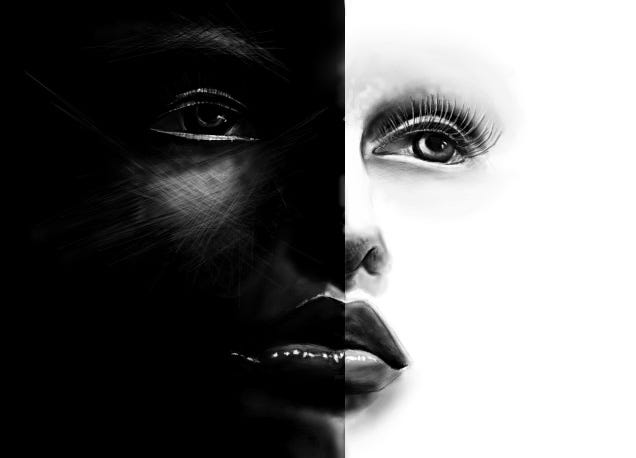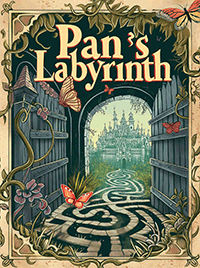Balancing light and darkness

This article is a short overview of some of what I’ve learnt about spiritual energy in both light and dark forms, what it means and how to balance it.
I’m going to give a very quick summary of yin-yang, just enough to follow the rest of this article, since I’ve discussed yin-yang many times before. Everything comes in twos: male/female, hot/cold, light/dark, good/evil, war/peace, etc. These two are in actuality different perspectives of the same thing, i.e. hot/cold are just different perspectives on heat, and light/dark are just different perspectives on the quantity of electromagnetic radiation. The thing that makes hot hot is where you, the observer, are standing. For example, water at 20°C is hot if the ambient temperature is 5°C and it’s cold if the ambient temperature is 40°C. It is not the water itself that is hot or cold, but the concept of hot or cold is relative to you, the experiencer. Likewise if you were confined to one room and then released into a city you would consider yourself free, whilst if you were used to travelling the world and were confined to one country you’d think yourself trapped.
This is precisely as one would expect within relativity (thank you Einstein for the math), because for something to be one way or another in and of itself would require an absolute universe in which there were a single point from where all else were measured. This absolute universe would not be philosophically possible, i.e. it’s unthinkable and unimaginable. The reason for this is that the absolute judge, i.e. the point from which all else is measured, if compared to itself would seem as nothing at all. Since existence itself is known by contrast of each thing against this absolute judge then the presence of an absolute judge disproves the existence of an absolute judge, precisely because it is only this thing’s opinion that matters and yet it is unable to see itself, hence it does not exist. Therefore it could be said that even if an absolute universe were to exist it would function identically as if it were a relative universe, because the ultimate judge’s first opinion would always be that itself didn’t exist, transforming the universe into universe without a judge, which is a relative universe. Relativity and absolutism turn out to be the same thing in disguise.
The result is that everything is experienced relative to your perspective, which is where you are currently standing. You see everything in contrast to yourself. Because everything comes in twos there are two ways to think of this: either you are the ultimate judge (hence why you can never know yourself), or there is no ultimate judge. But really this is just semantics, these two possibilities describe the exact same reality, just using different words. It is important to remember that there are many different ways to say the same thing, which look like you are saying different things, but this is only a trick of words. Do I have two blue squares next to each other, or one blue rectangle? Don’t let the words mislead you, it’s the same thing.
Now that I’ve quickly covered the foundational philosophy, let’s jump into discussing light and darkness. In the context of this article, when I speak of light and darkness I’m using these as metaphors for spiritual light and spiritual darkness; spiritual light being that particular form of energy which you can obtain through many means, but popularly by doing lots of yoga and meditation. This light is a type of currency in the spiritual world and it can be transferred between people (or other entities.) Energy is money; money is energy. Money and energy have the same characteristics: they’re invisible (or at least very subtle), yet can be transferred between people, and they have the power to make things happen.
Light is white because that’s how our brain’s interpret full-spectrum electromagnetic radiation, hence energy is associated with white, because it’s giving and we are receiving. Darkness is black because it’s absorbing energy and not giving out. Death is black because as something corrupts (dies) it no longer has anything to give and can only take. This is why things turn black when they die. This is also the reason why it is easy for us to symbolize good as white and evil as black; in this context ‘good’ is something that is giving to us, and ‘evil’ something that is taking from us.
However, all of this is only true from your perspective. Things that you consider light are not giving things in and of themselves, and things that you consider dark are not taking things in and of themselves. Energy naturally flows from high concentration to low concentration. For example, if you were at 100 points of energy and you met a 50 points of energy person you might feel them draining your energy; whereas a 25 points of energy person would consider the same person to be giving energy. Both are true, your interactions with other people are relative to your own energy state. Equally a 100 points of energy person will see very little difference between a 1000 and a 2000 points person, whereas a 1500 points person sees the two of them completely differently. Hence as you gain energy yourself it changes how you see other people.
An interesting effect of this is that an angel (I’m using the word metaphorically, but you can take it literally if you prefer) sees other angels as normal people, and regular humans as if they were demons. Since you are the comparison point it means that you can never become an angel yourself. You will always see yourself as normal, and you will always see those with greater energy than you as if they were angels, and those with much less as if they were demons, no matter how much energy you have. Obviously this means that if you tried to become more than other people you will never achieve your goal, instead you just make everyone else appear worse in your eyes. So you can go ahead and give up on trying to be better than other people for your own self-worth, at best all you will do is make everyone else look bad. Self-worth comes when you stop trying to be better.
It’s important to note here that while those people with more energy than you may appear angelic, this absolutely does not make them good people. This is a common fallacy. Likewise someone with low energy may appear dirty, and yet this fact does not make them a bad person. Having said that, people who do bad things tend to end up with low-energy, and people who do good things tend to end up with high-energy, but this is only true to the extent that smarter people are more likely to end up with more money, and dumber people with less money — it’s generally true overall but not really on an individual basis. There are good and bad ways to make money, just as there are good and bad ways to get energy; and then there are people who fall on hard times or are just happy with their lot already.
I want to make this point again because it’s one that leads many people astray: people with high-energy will look special but you do not know how they got their energy. They could be an energy-thief. It’s like assuming someone is intelligent just because they’re rich.
And what of darkness? Darkness is just a lower state of energy than what you are used to. But darkness is not evil, no more than cold is evil. Both too much heat and too much cold will kill you. Both fire and water can destroy a city. Evil and danger are not in the realm of darkness, they are in the realm of imbalance. Too much light is just as dangerous as too much darkness.
So what is darkness for? It’s easier to see if I switch the metaphor of light and dark to that of soft and hard. Now high-energy is soft, flowly and warm; likewise low energy is hard, prickly and cold. It’s true that here in the 21st century, on Earth, there is so much energy that is hard, prickly and cold that we are in dire need of some soft, flowy and warm energy. But this is not to say that that which is soft is better than that which is hard. And even if it were (which it’s not) you would still be unable to hold on to that which is soft without containing it within that which is hard. For example, when you drink a glass of water your purpose is to receive the nourishing water, but without the glass itself you could not do so. Without the hard container for the water how would you receive it? The glass, which is hard and cold, and therefore in this example symbolizing darkness, is a necessary ally that contains and protects the water until the time in which it is needed to be drunk.
This is barely even a metaphor. It’s literally an energy state. Solid turns into liquid, and liquid into gas, as it receives more energy. Put some ice cubes into a kettle and see it for yourself! But is water better than ice? Both have their uses in different contexts. And what happens when you put ice into a jug of water, does it not leech energy from the water until all is neutralized into the same energy-state? The very same effect happens with people.
Without darkness you would not even know what light was, everything would be white and so you’d see nothing at all. Without darkness there would be no light, just as without that which is ugly there would be no beauty. The goal of attempting to gain light at the expense of darkness results in a terrible imbalance. Too much light creates monsters, just as does too much darkness. If you destroyed all that was ugly you would not create a world with more beauty, you’d create a world with less beauty because you’d be reducing the potential for relative comparison, which is what makes beauty beautiful. If you avoided all that was hard and cold then you’d have no ground to stand on — literally!
Low or dense energy does not just contain and protect, it’s also where skill comes from. You can get a job done by putting in more time and energy (more light) but you can also get the job done by becoming more efficient. If you have high-energy then you’ll find that things just tend to go your way, and that’s because you have the energy to make things happen (in many cases you’re subconsciously buying the experience with your energy-currency, but that’s a subject for a different article.) Low-energy beings don’t have this privilege, they are energy-poor, and hence they become more efficient at the task, which means they can get the same thing done using less energy. This is extremely desirable, and simply doesn’t happen unless it has to. It’s darkness (low-energy) that by making people try harder results in more creativity, skill and novelty.
So why do people believe that light is better than darkness? They believe that they are approaching something good and they believe it because they feel it. I’m not saying that one should not try to get more light in one’s life, but I am saying that the problem is not that darkness is evil, but that they have too much darkness and not enough light. However when you’re in this state it’s easy to think that light = good and darkness = bad. It would be closer to the truth to say that balance = good and imbalance = bad (although there is an argument for imbalance but I won’t go into that here.) By gaining more light the person feels more balanced, but if they keep on gaining light without also doing the appropriate work to gain more stability and balance with the other side, i.e. darkness, then they are asking for trouble. An analogy I’ve used before is this: a person who is starving thinks that food is good and feels that they could eat forever, but if they did find more food and did eat forever they would become obese and eventually die. There must be a balance.
Can one have too much love, or too much happiness? Yes and yes. Let’s get real, when people say that they wish they were always happy they didn’t really think it through. What they really meant was that they wanted more love or more happiness. If they had only love and no fear then they’d have no defenses against those that would take advantage of them, and they’d swiftly be preyed upon and wouldn’t make it through the night. Likewise someone with only happiness would be unable to be compassionate, unable to relate to anyone else, unable to empathize. How about too much peace? Can you imagine a world with only peace? There would be no joy in anything, dancing and singing is only joyful relative to the struggle that you just overcame or escaped from.
I advise then to approach the light if that is what you are drawn to but not to do it at the expense of the darkness. Don’t think that by gaining more light you will become free of struggles, struggles are relative. If you gain more energy you will come into new, more difficult struggles. If you have more power you will have more powerful problems and more powerful enemies. There are common-sense rules for defending oneself physically, so that you don’t get attacked by spiders, wolves or other people and so that you can live in harmony with those around you. Likewise if you find yourself gaining energy and coming into the spiritual world there are also common-sense rules for defending yourself, most of which are just more fancy versions of the same rules that work physically.
Defense can be soft and subtle and that sometimes works, but if that’s all you can do then sooner or later you’ll come upon a situation where what you need to defend yourself is a sword and a shield (energetically speaking.) Swords and shields are hard, cold and pointy, and if all you ever practiced was soft, warm and flowy because you thought that love would conquer all then you’ll be in trouble.
If you embrace both that which is soft and that which is hard, that which is light and that which is dark, that which is hot and that which is cold, then you will be able to insulate yourself and sustain your energy. You will be able to hold on to light instead of having it drained into the environment almost as fast as you can capture it. You will be able to choose whom you share your energy with instead of just being a source of energy that lower-energy beings come to drink from.
That’s all for now folks! If you liked this article be sure to also check out my other articles The Way: How To Find It and How To Be A Buddha.

If you enjoyed this article, you’d like my book “Pan’s Labyrinth”.
Pan’s Labyrinth deftly blends fantasy and philosophy, crafting a thought-provoking narrative that lingers in the mind long after the final page is turned. It invites readers to question the nature of reality and explore the profound ideas woven throughout the story. Engaging and intellectually stimulating, this book promises a reading experience that is both entertaining and deeply meaningful.
